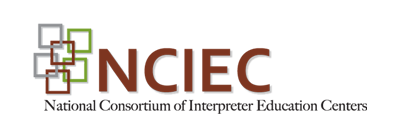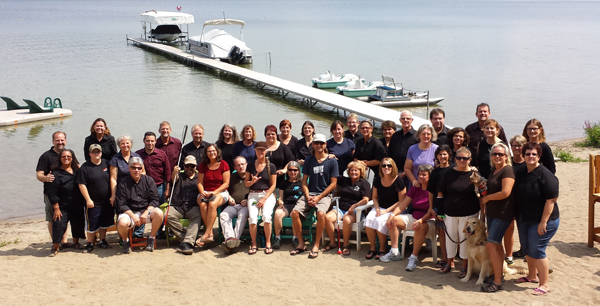Deafblind Self-Advocacy Trainers Eager to Serve
Ten DeafBlind individuals from ten states are now ready to instruct their peers in developing self-advocacy skills using the new DeafBlind-dedicated supplement to the National Consortium of Interpreter Education Centers’ (NCIEC) Deaf Self-Advocacy Training (DSAT) Curriculum Toolkit. All participants currently hold positions in organizations and agencies that serve Deafblind clients and all are committed to taking the program out to individuals and groups in their home regions.
The NCIEC developed the DeafBlind Self-Advocacy Training (DBSAT) supplement during the 2012-13 grant year with assistance from consultants Jean Healy and Janet K. Marcous who are both DeafBlind. Available in a variety of formats, the supplement is incorporated into the DSAT Curriculum Toolkit and may be requested at no cost, by contacting deafselfadvocacy@gmail.com.
The four-day train-the-trainer program had several aims for participants: to experience the curriculum from the perspective of consumers they will teach; to share and identify the characteristics of one’s own successful experiences of self-advocacy; to define the meaning of full communication access for DeafBlind individuals; to practice providing constructive feedback and recommendations to interpreters; and to practice tact and diplomacy for effective self-advocacy. Activities included using foam board/letters to select a word that best fits the notion of self-esteem; identifying the distinctions between an interpreter and SSP/Provider, identifying the qualities of a skilled and knowledgeable interpreter who works with individuals who are DeafBlind; selecting a tenet of the interpreter Code of Professional Conduct and its application in different scenarios; and practice teaching an assigned module using a new activity of one’s own creation.
In keeping with the DSAT “…of, by, for…” philosophy, an all-Deaf/DeafBlind environment contributed to the learning and networking experience. Held at the Holley Family Village in Brooklyn, Michigan, the train-the-trainer program was staffed by an all-Deaf team of fourteen interpreters and eight SSPs. Instructors Lillian Garcia Peterkin, (NCIEC) and Laura Thomas (HKNC Great Lakes) were also Deaf. The classroom was alive with discussion and learning activities, fully accessible through interpreting and ProTactile techniques that effectively bring in environmental information and backchanneling.
The training was well received by participants. “This has been an awesome opportunity to interact with my peers of many functions and build a network,” said Ashley Benton, a participant from North Carolina. As a DeafBlind Service Specialist serving eastern North Carolina, Ashley is committed to using the tools she gained here to train her clients in self-advocacy.
Lee Clark, another participant, commented on the staff: “…The experience has been amazing. All, and I mean ALL, of the interpreters and SSPs are Deaf. It is mind blowing.”
Trainer Laura Thomas emphasized the importance of this training and its intended impact:
The format and communication access provided optimum participation, learning and desire to share and teach in the participants’ regions. This training is so significant and critical because with the focus on self-advocacy, DeafBlind consumers will develop confidence and the skills necessary to feel like a full member of society. We must instill the philosophy that we as individuals are responsible for ourselves and to communicate to others (medical, on the job, family, the community and public facilities) what is needed for full access. DBSAT is designed for this safe peer-to-peer learning environment with mutual understanding and support of life’s experiences and challenges. The seven modules will enable DeafBlind participants to be responsible and active consumers in their VR process, on the job, or receiving mental health/medical services. Self-determination and having available resources is the core of achievement in life. Ultimately, the DBSAT’s goal is to have participants be self-reliant and seek resources to make better-educated decisions for communication access, rather than relying on service providers.
Empowering DeafBlind individuals to carry DBSAT forward is at the core of this program. NCIEC is grateful for the commitment and sheer will-power of our DSAT work team that made the training possible: Pauline Annarino, Diana Doucette, CM Hall, Richard Laurion, and Lillian Garcia Peterkin. We also thank June Prusak, interpreter coordinator, Jill Gaus, SSP coordinator, and Ardis Garadella and Jeremy Vinluan of the Holley Family Village. And special thanks to collaborators, without whose resources the program would not have been possible: Helen Keller National Center, the Holley Institute, Sorenson Communications, and Washington State DeafBlind Citizens.
And like the train-the-trainer program – indeed like any successful DeafBlind activity – supporting and sustaining DBSAT for DeafBlind consumers across the U.S. will require the collaborative commitment, energy, and resources of multiple individuals, agencies, and organizations. We hope that ADARA members, among others, will work with these newly trained and very enthusiastic DBSAT trainers to coordinate and support ongoing consumer trainings in your area.
The trainers:
Ashley Benton (NC) ashleybenton@aol.com
Vincent Lee Clark (MN) lee.clark@state.mn.us
Elaine Ducharme (MA) educharme@deafinconline.org
Andy Granda (CA) serviceomatic@gmail.com
Victoria Ann Magliocchino (FL) VickyMaglio@yahoo.com
Karen Park (CO) sunflowerkp@aol.com
Kim Powers-Smith (TX) kimpowerssmith@gmail.com
Angela Theriault (OR) atheriault@seattledbsc.org
Christopher Woodfill (NY) Chris.Woodfill@hknc.org
Bryen N. Yunashko (IL) hello@bryen.com
A San Diego native, Andy Granda, had only a few words to say when he was asked to describe his experience during the program. “Five Letters,” remarked Andy, “’C-H-A-M-P.’ “One of the best and most memorable experiences I have had as a Deafblind individual,” Andy adds. Like others in the program, Andy strongly encourages the continuation of the DBSAT program in the future.
The National Consortium centers are funded from 2010-2015 by the U.S. Department of Education Rehabilitation Services Administration, CFDA #84.160A and 84.160B.

